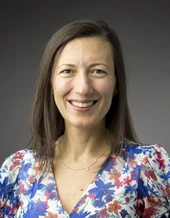Yelda Turkan

Fellowship
Hans Fischer Fellowship
Appointment
2024
Institution
Oregon State University
Department
School of Civil and Construction Engineering
Host
Prof. André Borrmann
Focus Group
Digital Twins for the Built Environment
Short CV
Dr. Yelda Turkan is an Associate Professor in the School of Civil and Construction Engineering at Oregon State University. She earned her Ph.D. in Civil Engineering from the University of Waterloo, Canada, and holds dual Bachelor of Science degrees in Civil Engineering and Geomatics Engineering, as well as a Master of Science in Remote Sensing from Istanbul Technical University. Dr. Turkan’s research focuses on the application of computer vision and machine learning technologies to foster a sustainable and resilient built environment. With over 80 peer-reviewed publications, Dr. Turkan has made significant contributions to the field. She has served as Associate Editor for the ASCE OPEN Journal since 2023 and has been a member of the editorial board for the Advanced Engineering Informatics Journal since 2020. Her research program has created over $4.5 million in grant funding, supported by agencies such as the National Science Foundation and the National Cooperative Highway Research Program, among others. In addition to her academic achievements, Dr. Turkan holds leadership roles in key professional organizations. She is the Vice President of the International Association for Automation and Robotics in Construction and serves as the Chair of the ASCE Computing Division Executive Committee.
Selected Awards
- 2024, Visiting Scholar Grant, Department of Graphic Expression and Building Engineering, School of Building Engineering, University of Seville, Spain
- 2023-2025, Robert C. Wilson Faculty Scholar, Oregon State University
- 2022, Research Advancement Academy (RAA) Fellow, Oregon State University
- 2019, Travel Grant to attend the NSF NHERI Facility – E-Defense Earthquake Center Collaboration Meeting in Kobe, Japan
- 2019, Travel Grant to attend the NSF NHERI Facility – EUCENTRE Collaboration Meeting in Pavia, Italy
- 2018, The Associated General Contractors (AGC) Education and Research Foundation, Robert L. Bowen Industry Residency at JE Dunn Construction, Portland, OR
- 2015, American Society of Civil Engineers (ASCE) ExCEEd Teaching Fellow
- 2015, Outstanding Reviewer for Elsevier Journal of Automation in Construction
- 2008, Provost Doctoral Entrance Award for Women in Engineering, University of Waterloo
- 2003, Ranked 3rd in department graduates, Geomatics Engineering, Istanbul Technical University
Research Interests
Digital twins, scan-to-BIM, machine learning, computer vision, geospatial data analytics, automation in construction.
Prof Turkan’s work leverages advanced tools such as LiDAR and digital twins to enhance the planning, monitoring, and management of construction operations, ultimately improving decision-making processes in the construction sector.
Selected Publications
- R. Longman, Y. Xu, Q. Sun, Y. Turkan, M. Riggio, Towards a digital twin for monitoring in-service performance of post-tensioned self-centering cross-laminated timber shear walls, ASCE Journal of Computing in Civil Engineering, Special issue on Digital Twin for Smart Building and Infrastructure, 2023, Vol. 37 (2). https://doi.org/10.1061/(ASCE)CP.1943-5487.0001050
- Q. Sun, Y. Turkan, E. C. Fischer, A building information modeling-fire dynamics simulation integrated framework for the simulation of passive fire protection in a mid-scale cross-laminated timber compartment: Numerical implementation and benchmarking, Fire and Materials Journal, Special Issue on Fire Research for Timber Structures, 2022, Vol. 47(4), pp. 525-541. https://doi.org/10.1002/fam.3070
- F. Shalabi, Y. Turkan, BIM – Energy Simulation Approach for Detecting Building Spaces with Faults and Problematic Behavior, Journal of Information Technology in Construction, 2020, Vol. 25, pp. 342-360. https://doi.org/10.36680/j.itcon.2020.020
- Q. Sun, Y. Turkan, A BIM-based Simulation Framework for Fire Safety Management and Investigation of the Critical Factors Affecting Human Evacuation Performance, Advanced Engineering Informatics, 2020, Vol. 44, pp. 101093. https://doi.org/10.1016/j.aei.2020.101093
- N. Puri, Y. Turkan, Bridge Construction Progress Monitoring using Lidar and 4D Design Models, Automation in Construction, 2019, Vol. 109, pp. 102961. https://doi.org/10.1016/j.autcon.2019.102961
- Y. Turkan, J. Hong, S. Laflamme, N. Puri, Adaptive Wavelet Neural Network for Terrestrial Laser Scanning Based Crack Detection, Automation in Construction, 2018, Vol. 94, pp. 191-202. https://doi.org/10.1016/j.autcon.2018.06.017
- N. Puri, E. Valero, Y. Turkan, F. Bosché, Assessment of Compliance of Dimensional Tolerances in Concrete Slabs using TLS data and the 2D Continuous Wavelet Transform, Automation in Construction, 2018, Vol. 94, pp. 62-72. https://doi.org/10.1016/j.autcon.2018.06.004
- F. Shalabi, Y. Turkan, IFC-BIM Based Facility Management Approach to Optimize Data Collection for Corrective Maintenance, ASCE Journal of Performance of Constructed Facilities, 2016, Vol. 31(1), pp. 04016081. https://doi.org/10.1061/(ASCE)CF.1943-5509.0000941
- F. Bosché, M.A. Ahmed, Y. Turkan, C.T. Haas, R.G. Haas, The value of integrating Scan-to-BIM and Scan-vs-BIM techniques for construction monitoring using laser scanning and BIM: The case of cylindrical MEP components, Automation in Construction, 2015, Vol. 49, pp. 201-213. https://doi.org/10.1016/j.autcon.2014.05.014
- Y. Turkan, F. Bosché, C.T. Haas, R.G. Haas, Automated Progress Tracking Using 4D Models and 3D Sensing Technologies, Automation in Construction, 2012, Vol. 22 (2), pp. 414-421. https://doi.org/10.1016/j.autcon.2011.10.003